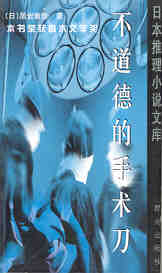04道德经英译本85种-第31部分
按键盘上方向键 ← 或 → 可快速上下翻页,按键盘上的 Enter 键可回到本书目录页,按键盘上方向键 ↑ 可回到本页顶部!
————未阅读完?加入书签已便下次继续阅读!
The gods of the land do not inflict injury upon the inhabitants; nor do those which belong to other lands。
* Compare Lun Yü; Book III; chap。 VI:?## etc。
The Sage; also; inflicts no injury on his subjects; neither he nor they injure each other; so that the virtue of both unites and converges 'in one direction'。
61
A great State is the rendezvous towards which the whole Empire converges; it is a Mother among all nations。 The maternal or female principle; by means of quiescence; ever vanquishes 'the inquietude of' the male principle。
The 'prince'; by a quiescent policy; makes himself humble。
It is for this reason that a great State; by bearing itself humbly towards a small State; gains its allegiance; and a small State; by bearing itself humbly towards a great State; may obtain possession of it。 Thus an inferior 'State' can either be taken by this means; or can itself take 'a superior one'。
When a great State has no desire beyond protecting all its subjects equally; and a small State has no desire but to belong to 'the greater one' and to serve its Prince; both will attain to the positions proper to each。 Those who aspire to greatness must humble themselves。
62
TAO is the deep reservoir of all things。 It is the jewel of the good man; the guardian of the bad。
Virtuous words are marketable; honourable deeds may be made over to the credit of others。 What reason is there for casting a man off on account of his being unvirtuous?
Wherefore; though the Emperor be enthroned; and his Ministers appointed; holding their jade badges of office in front of them and riding in a chariot and four: it would be better to remain seated in quiet; and to adopt; or enter into; this TAO。
It was this TAO that the ancients reverenced。 Why do not 'the rulers of to…day' strive daily to acquire it? The ancients taking the national sins upon themselves; their subjects put away their depravity; and therefore they were honoured by the whole Empire。
* See Lun Yü; Book XX; chap。 1; sec。 3。
63
'The Sage' acts as though not acting。 He occupies himself as though having nothing to do。 He relishes that which is insipid梩he TAO。
The great; the small; the many; the few; 'are all equal in his sight'。 He recompenses injury with kindness。 In setting about difficult tasks; he begins with what is easy。 In performing great things; he begins with little ones。
The difficult affairs of the world must be begun from what is easy the great things of the world must be begun from what is small。 That is why the Sage never sets about great undertakings and yet is able to accomplish great things。
Lightly made promises lead to very little faith 'being placed in the promiser'。 He to whom most things are very easy at first will certainly find many difficulties afterwards。 Thus the Sage always recognises the existence of difficulty; and by this means he never experiences any difficulty in practice。
64
When 'the State' is at peace; it is easily supported; or maintained。 When portents have not yet appeared; it is easy to provide for 'future contingencies'。 When a thing is brittle; it is easily broken。 When a thing is minute; it is easily dispersed。
Act before pressing necessity for action arises。 Govern well the State before anarchy breaks out。 A tree which takes the arms of two men to span it; grew from a tiny sprout。 A tower nine storeys high was raised from a mound of earth。 A journey of a thousand li begins with a foot's pace。
He who acts; fails; he who grasps; loses。 The Sage never acts; and therefore he never fails; he never grasps; and therefore he never loses。
The people; in their undertakings; frequently fail when they are on the verge of accomplishment。 The cautious act towards the end of an undertaking as at the commencement; and that is why they never fail。
Thus the Sage desires as though he desired not; and attaches no value to things difficult of acquisition。 He learns what others do not learn; and returns to what is passed over by the multitude。 By this means he promotes the spontaneous development of all things; and that without venturing to act。
65
Those who; in ancient times; were eminent for the practice of TAO; abstained from enlightening the people; and kept them simple。
The difficulty of governing the people arises from their excess of shrewdness。 He who employs shrewdness in governing a State; becomes a robber of the State; he who does not do so; is a blessing to it。 The man who knows both these things presents an ideal of good government; and a knowledge of this ideal constitutes Sublime Virtue。 Sublime Virtue is deep and far…reaching; and is in direct opposition to all objects of desire; thus it is able to bring about universal accordance 'with TAO'。
66
The fact that rivers and seas are able to be rulers over all water…courses is due to their downward tendency。 It is on account of this that they are able to dominate all waters。 Therefore the Sage who desires to reign over the people must be retiring in demeanour。 Then; when the Sage occupies a high position; his subjects will not be self…sufficient; when he leads the van; his subjects will not work injury 'by disobedience or rebellion'。 Thus it comes that the whole Empire delights to render him his dues; and that without reluctance; in that he never strives; therefore the Empire is unable to strive with him。
67
The inhabitants of the world all say that I am great 'i。e。; greatly tolerant'; although I have the appearance of incompetence。 This apparent incompetence is the result of my very greatness。 In the case of one who is possessed of more than ordinary ability; he sets his mind constantly upon even the smallest matters。
Now there are three things which I regard as precious; which I grasp and prize。
The first is compassion; the second is frugality; the third is not venturing to take precedence of others梞odesty。
I prize compassion; therefore I am able to be fearless。 I prize frugality; therefore I am able to be liberal。 I prize modesty; therefore I am able to become a leader of men。 But men of the present day abandon compassion; yet aim at valiancy; they abandon frugality; yet aim at being liberal; they abandon modesty; yet aim at leadership。 This is death to them。
Now when one is compassionate in battle; he will be victorious。 When one is compassionate in defending; his defences will be strong。 When Heaven intends to deliver men; it employs compassion to protect them。
68
Those eminent for scholarly virtues are not fighting men。 Those eminent in war do not lose their temper。 Those eminent for victory do not struggle。 Those eminent for making use of others descend to their level。
This may be called the virtue which does not contend; the power of utilising men; the utmost limit that can be reached in equalling Heaven and the men of old。
69
There was a saying among the military commanders 'of old':?I do not venture to act the host梣。d。; to give battle; I prefer to be the guest梩o await the attack。 I do not venture to advance an inch; I prefer to retire a foot。〃 This may be called operating negatively; and appropriating 'the enemy's possessions' without infringing propriety。 Were this policy pursued; there would be no withstanding 'of our arms'; and capture might be effected without striking a blow。
There is no greater calamity than that of despising an enemy。 By underestimating the enemy one brings about the loss of 'the three things' I prize。 Wherefore when opposing forces meet in battle; it is the compassionate who conquer。
70
My words are easy to understand; easy to put in practice; 'yet' the world can neither understand nor practise them。
My words have an underlying intent; my actions have a ruling motive。 It is only ignorance that causes men not to understand my doctrine。
Those who understand me are few; those who copy me are worthy。 Wherefore the Sage dresses in coarse robes while hiding a jewel in his breast。
71
Those who understand 'the TAO' are up conscious of their upward progress。 Those who count their ignorance as knowledge; are diseased。 It is only those who treat themselves as sick who are therefore free from disease。 The Sage; who is not diseased; treats himself as though he were; wherefore his disease becomes no disease at all。
72
When the people do not stand in awe of severe enactments; great visitations will befal 'the State'。
When 'a man' does not behave indecorously within doors; he will not inspire disgust in others。 It is only when 'the prince' does not inspire disgust that 'his subjects' will submit to him without reluctance。
Wherefore is it that the Sage; though possessed of intuitive knowledge; yet makes no self…display; respects; but does not exalt himself; thus adopting the one course and avoiding the other。
73
When bravery is pushed to rashness; a man will incur a violent death。 When courage is tempered by caution; he will preserve his life。
These two conditions result; the one in benefit; the other in injury。 Who knows the cause of Heaven's animosity 'to either'? Thus it is that even the Sage here sees a difficulty。
The TAO of Heaven never strives; yet excels in victory; it speaks not; yet excels in responding 'to desert'; it beckons not; yet 'things' come to it of their own accord; it lies concealed; yet excels in organising。 The net of Heaven extends everywhere。 Its meshes are wide; but nothing ever escapes it。
74
If people do not fear death why attempt to frighten them by capital punishment?
Supposing the people are made constantly afraid of death; so that when they commit unlawful acts I arrest them and have them killed; who will dare 'afterwards to misbehave'? For then there will always be yiu…sze; or civil magistrates; to execute them。 Now the execution of men on behalf of the inflictor of the death…punishment 'by those not legally qualified to do so' may be compared to hewing on behalf of a master carpenter; and people who 'attempt to' hew instead of a master carpenter mostly cut their hands。





